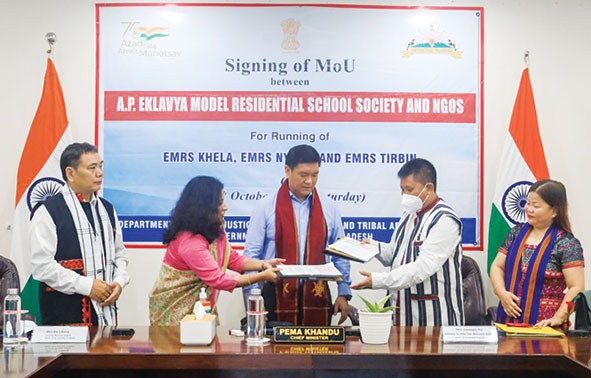ITANAGAR, 9 Oct: “It is tough to run residential schools for the government; therefore, it is much appreciated that experienced NGOs volunteer to run such schools to provide quality education to rural children,” said Chief Minister Pema Khandu on Saturday during an MoU signing ceremony between the state government and NGOs to run three Eklavya Model Residential Schools (EMRS), one each in Nyapin (Kurung Kumey), Khela (Tirap) and Tirbin (Leparada).
The MoUs were signed by the Arunachal Pradesh EMRS Society and NGOs Gyamar Art & Cultural Society, Arunachal Shiksha Vikas Samiti and VKV Arunachal Trust to run the EMRS’ in the three areas. The three new schools will start functioning from the next academic session.
The EMRS is an initiative of the union tribal affairs ministry and the state government, through the social justice & empowerment and tribal affairs (SJETA) department, to ensure that all tribal students in remote areas have access to quality education. It is a premium coeducational institute for Class 6 to 12.
“The EMRS model has been a successful one across the country, but in all these years, Arunachal Pradesh could establish only two such schools – one in Bana in East Kameng, which is run by the VKV Trust, and the other in Lumla in Tawang, run by the Art of Living. With the three schools beginning from this session, we will have five EMRS’ running. Five more are coming up in a few more districts, which are in different stages of establishment,” Khandu said.
He further informed that two EMRS’ – one in Medo (Lohit) and the other in Dambuk (Lower Dibang Valley) – are under construction and will be ready by March 2022, while the process for land identification and acquisition is on for establishment of EMRS’ in Aalo (West Siang), Seppa (East Kameng) and Itanagar (Papum Pare).
The union tribal affairs ministry provides 100 percent funds for establishment of EMRS’. As per the new pattern of funding, Rs 24 crores
will be released for the construction of each EMRS. However, suitable and sufficient land (15 acres minimum) will have to be provided by the state government free of cost.
Underlining the importance of quality education, the chief minister reiterated his concern over the poor quality of education in government-run schools.
“Government school teachers are highly paid, compared to those teaching in NGO-run schools, but the difference in the quality of education between these schools is stark. We are producing certificate holders but not people with real knowledge,” he said, and called upon the education department to focus on restructuring the functioning of the government schools.
Khandu further suggested converging old or defunct government schools with schemes like the EMRS and handing them over to reputed NGOs.
SJETA Minister Alo Libang, SJETA advisor Dasanglu Pul, Education Commissioner Niharika Rai and the SJETA special secretary were also present at the signing ceremony. (CM’s PR Cell)



